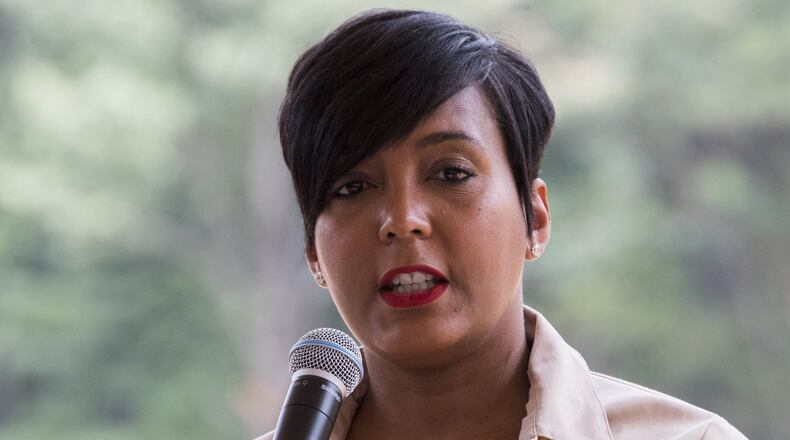A little-known provision in the Trump administration’s 2017 tax overhaul could bring a rush of investment to distressed neighborhoods in Atlanta and across the nation.
But the program, known as Opportunity Zones, has virtually no safeguards to reduce the risk of gentrification, require investments in affordable housing, or demonstrate the money has helped improve the lives of longtime residents.
On Wednesday, Mayor Keisha Lance Bottoms and the Rockefeller Foundation announced a partnership to help encourage socially conscious investment in Atlanta's 26 opportunity zone neighborhoods, and to reduce the risk of displacement of longtime residents and businesses.
A significant part of the partnership is a $1 million grant from the Rockefeller Foundation.
Among other things, the money will a fund a Chief Opportunity Zone Officer to help create projects that balance investors’ interests with the needs of existing residents and businesses.
“We know the Opportunity Zone law lacks any real regulatory safeguard,” said Rockefeller Foundation President Rajiv J. Shah.
Shah said the foundation is committed to promoting affordable housing within Opportunity Zones. Its goals also include giving local residents and business owners a say in the investments, and measuring the impact to both investors and community stakeholders.
Shah said that foundation’s hope is that the partnership will help “lift all boats and not just the yachts.”
The Opportunity Zone incentive allows investors with unrealized capital gains or investment income to sell assets and reinvest those profits into real estate and businesses inside 8,700 low-income U.S. Census tracts across the nation.
Opportunity Zones could unleash hundreds of billions — if not trillions — of dollars in investment into low income urban and rural census areas.
But government watchdogs argue the program lacks accountability.
Investors can remain secret. There is no database tracking projects. And the program lacks requirements for investment in low-income housing or other social programs.
Atlanta has 26 Opportunity Zones, which are home to about 82,000 people. They are concentrated in south and southwest Atlanta, with poverty rates triple the national average and unemployment rates four times the national average, according to Shah.
Invest Atlanta has developed an Opportunity Zone web portal to help connect developers and businesses with socially conscious investors. The agency will also try to use other incentives to promote affordable housing.
After decades of losing population since the recession, Atlanta has seen an influx of people from white collar job creation. Intown neighborhoods have became attractive markets for developers. But the real estate gold rush has led to some residents being displaced because of rising property prices and taxes.
In July, a report by the Federal Reserve Bank of Philadelphia found Atlanta was the fourth-fastest gentrifying city in the country from 2000 to 2014, trailing only Washington, Portland and Seattle.
Wednesday’s press conference was attended by a few dozen developers and businesses owners who represent eligible Opportunity Zone projects.
One of the best known is a proposed redevelopment of the Mall West End along Ralph David Abernathy Boulevard. Investor Donray Von and Beltline visionary Ryan Gravel have pitched a $300 million mix of offices, hotels, homes, restaurants and shops within walking distance of the Beltline’s southwest trail and the West End MARTA station.
The development is a for-profit venture, but the pair have socially conscious aims. They’ve proposed 20 percent to 30 percent of housing units be reserved at below-market rents; small business training and lending assistance; and a $10 million to $15 million fund to help grow West End-based companies.
Derrick Barker is a developer with DOMOS Co-Living, a company that builds apartments in which tenants rent by the bedroom and share kitchens and other common spaces like a dormitory. Barker has a project on the Invest Atlanta website and said he’s hoping it will help him attract investors.
“We’ve always been focused on how do we find ways to create more supply in the areas of greatest need of housing,” he said. “Opportunity Zones just make sense for us to be able to build in areas we’re already working on.”
Opportunity Zones are federally designated areas that allow investors to defer, reduce or eliminate capital gains tax depending on how long the investment is held and if the gains are re-invested back inside the zone. Atlanta’s 26 opportunity zone neighborhoods have poverty that is three times the national average and unemployment four times the national average. Because of a provision in the 2017 Trump tax overhaul, billions of dollars in new investments are expected to flow into these communities without safeguards to reduce the risk of gentrification.
Keep Reading
The Latest
Featured





